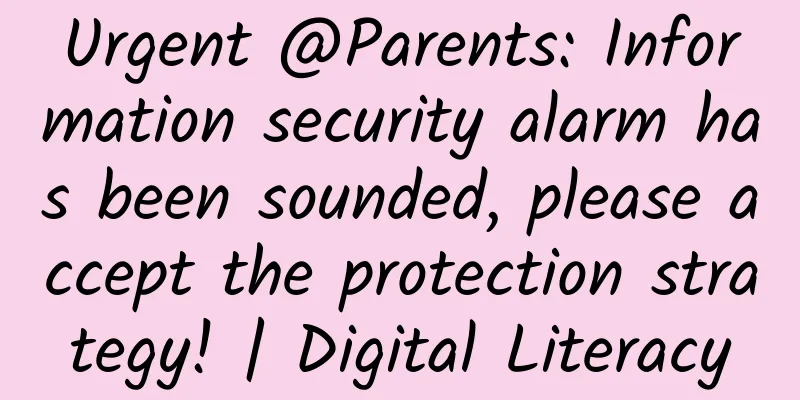Urgent @Parents: Information security alarm has been sounded, please accept the protection strategy! | Digital Literacy

|
Review expert: Liu Xiangquan, Director of the Robotics Engineering Department of Beijing Information Science and Technology University Can you get red envelopes by registering on WeChat and scanning the QR code? “Place an order” to get cash back and receive gifts? Can idle bank cards “make money”? Forward the QR code to receive a gift? … Why did you receive this information? How was your information exposed? How can you protect yourself? These questions are enough to read this article! In this era of information explosion, personal information is like an intangible asset with extremely high value. However, the risk of information leakage is always there, bringing many hidden dangers to our lives. It has become a top priority to understand the harm of information leakage and take effective protective measures. Copyright images in the gallery. Reprinting and using them may lead to copyright disputes. What are the ways of information leakage? 1. Network applications and platforms Various mobile applications and websites are common channels for information leakage. When registering an account, we often need to fill in a lot of personal information, such as name, phone number, address, etc. Some bad platforms or application developers may not properly store user data, resulting in data being hacked or illegally sold by insiders. 2. Social Networks Social media is a platform for us to share our lives, but it can also be a source of information leakage. The photos and statuses we post inadvertently may contain personal sensitive information, such as location, work unit, etc. In addition, the friendships on social media may also be used by criminals to carry out targeted fraud. 3. Public wireless networks Connecting to free wireless networks in public places may seem convenient, but it also carries great risks. Criminals may set up fake wireless network hotspots to steal data transmitted by users during the connection process, including account passwords, bank information, etc. 4. Waste electronic equipment If the personal information stored in obsolete mobile phones, computers and other electronic devices is not completely cleared before disposal, it may cause information leakage once it is obtained by others. The dangers of information leakage! 1. Property loss The leakage of personal information may lead to bank account theft and credit card malicious overdraft, causing direct economic losses. 2. Privacy Invasion The exposure of personal life privacy, such as home address, whereabouts, etc., brings great trouble and anxiety to life. 3. Identity theft Criminals use stolen personal information to apply for loans and documents in other people’s names, causing victims to bear inexplicable debts and legal responsibilities. 4. Damaged credit Information leakage may lead to the tampering of personal credit records, affecting future credit, employment, etc. 5. May violate the crime of "assisting in the act" The crime of aiding and abetting information network crimes: that is, the crime of assisting and abetting information network criminal activities. What measures are there to protect the security of personal information? 1. Enhance safety awareness Increase the level of attention paid to the protection of personal information and do not provide sensitive information on unreliable platforms. 2. Set a complex password Use complex passwords that include letters, numbers, and special characters, and change them regularly. (If parents can't remember them, they can send them to their children as a backup!) 3. Use public networks with caution Try to avoid performing operations involving sensitive information on public wireless networks, such as logging into important accounts, making payments using Alipay or WeChat, etc. 4. Clean your electronic devices regularly Delete files and apps you no longer use, and perform professional data sanitization on old electronic devices. 5. Pay attention to the privacy policy Before using an app or platform, read the privacy policy carefully to understand how your personal information is used and protected. (If there is a privacy policy, be sure to read it carefully and don’t take it lightly!) 6. Enable two-factor authentication Enable two-factor authentication for important accounts to increase account security. Personal information security is the line of defense we must defend in the digital age. Only by being vigilant at all times and taking effective protective measures can we protect our personal information from the threat of leakage and allow us to enjoy a safe and convenient digital life. Let us act together to protect the security of personal information. Some sources: People's Daily Science, Ping An Beijing Chaoyang, etc. The cover and text images are copyrighted images of the gallery. Reprinting and using them may cause copyright disputes |
Recommend
In addition to hosting the World Cup, Qatar's "money power" also allowed this parrot to be reborn
Just the day before yesterday, the Qatar World Cu...
How to select high-quality APP promotion channels?
With the rapid development of the mobile Internet...
2020 Suntech Financial Management Full Tutorial
2020 Suntech Financial Management Full Tutorial 1...
How to plan a hot-selling promotion event that will sweep the screen?
Every operator hopes to plan a hit event that wil...
Play with short video 3D animation parenting book list number: actual operation a day thousands, a day tens of thousands of income
So, Yuntian came up with a plan to create such an...
Under the double reduction policy, the market for unpopular products with strong demand from primary school students can generate a profit of 300+ per order.
To see how strict the current double reduction pol...
The private domain skills of urban beauties with over 200,000 followers!
Affected by the epidemic, many traditional retail...
These 7 steps helped me reach 1 million users in 6 months
Achieve 100,000 users in 6 months I had just arri...
5 Tips for Using Tik Tok to Master Film and Television Marketing!
Since Tik Tok became popular, there is another ne...
Brand Spring Festival Marketing War
There are less than 3 weeks left until the 2022 S...
Weibo Super Fans Practical Tutorial (30-hour video course)
Chapter 1: Introduction to Weibo Fantong Basics 1...
For the first time in the world, how difficult is it to "dig soil" on the back of the moon?
On May 3, 2024, the Chang'e-6 probe boarded t...
What is the difference between people who take a walk after a meal and those who don’t? Pay attention to this point!
Walking is a simple and effective form of exercis...
Why are high-defense servers so expensive?
Why are high-defense servers so expensive? The In...
What does urbanization of agricultural migrant population mean? How to accelerate the urbanization of my country’s agricultural migrant population?
The Ministry of Finance has issued a bonus for th...









